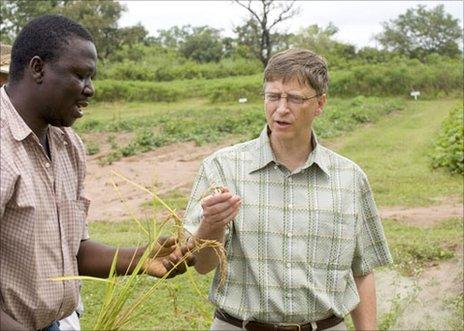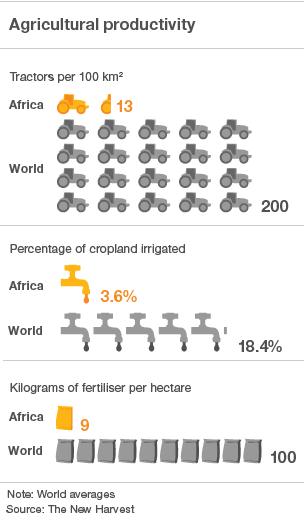Replanting Africa the Bill Gates way
- Published

Bill Gates visited Nigeria in 2006 to hear about grain production
Along with spending billions of dollars on better healthcare for the world's poor, Microsoft founder Bill Gates is increasingly turning his attention to Africa's struggling small farmers.
In an interview for the BBC World Service, the world's most influential philanthropist explained why farming was now his foundation's second-biggest programme.
The approach, he said, combined practical aid such as improved seeds with better information for the growers.
Pressed on the controversial issue of genetic modification, he said he saw it as a solution in some cases, although to date most of the foundation's seed work was non-GM.
Soaring food prices have added a new urgency to the plight of subsistence farmers on a continent where agriculture has not seen the kind of progress achieved in recent decades elsewhere.
In a recent book, The New Harvest, Harvard University professor Calestous Juma estimated that while global food production had grown by 145% over the past 40 years, African food production had fallen by 10% since 1960.
Model farmers
Since 1994, the Bill and Melinda Gates Foundation has spent about $3.3bn (£2bn; 2.3bn euros) on global development, including agricultural aid, compared to $14.5bn on global healthcare.
One farmer in eastern Ghana who spoke to the BBC complained that subsistence farmers in his region continued the traditional practice of slash and burn cultivation, without regard for the soil.
Mr Gates said his programme aimed to reduce the practice through supplying new, more productive seeds, conducting soil surveys and putting up capital for easier loans to buy seeds and fertilisers.
A second farmer, in Kenya, told the BBC problems in her region ranged from poor roads to lack of information about what seeds and pesticides to use.
Farmers, she said, were sometimes cheated by dealers who sold counterfeit seeds, while lack of information about how to use insecticides and fungicides meant chemicals were sometimes mixed wrongly.
Mr Gates said his programme was supplying farmers with better information by radio.
It was also interviewing successful local farmers to video their work. Other farmers could relate to these films, he said, because they featured producers who spoke their dialect and worked in similar conditions.
GM option
Asked for a particularly striking example of how he had helped agriculture in Africa, Mr Gates recalled meeting women rice farmers confronted with flood problems.

Their crop would often die from being submerged in water too long, he said.
In response, the Gates foundation co-created a new strain called stress-tolerant rice.
Since the crop was planted, it had proven not only to be hardier but had also produced higher yields, Mr Gates said.
While stress-tolerant rice was created through normal cross-breeding, and not genetic modification, he added, some of the foundation's projects did involve GM.
"You often have traits, like dealing with high temperatures, that you can't get anywhere else," he argued.
"Unfortunately these poor farmers are going to be facing warmer climates because of global warming so I think it is appropriate to employ whatever tools we can use that are safe and affordable for them.
"I absolutely think that, in some of those cases, genetic modification is how we will get them the new seeds."
GM crops - seen by critics such as Greenpeace as an environmental hazard - are currently grown on about 10% of the world's arable land area, as defined by the UN, with about half of the global total accounted for by the US.
However, if current trends continue, developing countries will be growing more than half of the global total within a few years.
Government role
The Microsoft founder's call for investment in poor small farmers, external has been encouraged by Washington, which has moved towards co-operation with an African agency co-sponsored by his foundation.
Just a few days ago, US Agriculture Secretary Tom Vilsack signed a memorandum of understanding with the Alliance for a Green Revolution in Africa, external (Agra), aimed at boosting productivity on smallholder farms on the continent.
Joint work is envisaged to develop seeds, enrich soil, cut crop loss and manage water resources.
There will also be programmes to train farmers, create market information systems and improve infrastructure, with the initial focus on increasing food production in potential grain production centres such as Ghana, Kenya, Mali, Tanzania and Mozambique.
"Agricultural development is the key to unlocking increased incomes and combating poverty for millions of people and many nations," Mr Vilsack said at the signing in Washington.
"We are very excited about what can happen when you help farmers to be more productive," Mr Gates told the BBC.
"Not only to grow enough to feed themselves and their kids, to improve nutrition so those kids can develop their full potential, but also to give them cash income so they can send those kids to school and the price of food can come down, for the urban poor included."
- Published2 December 2010
- Published22 February 2011